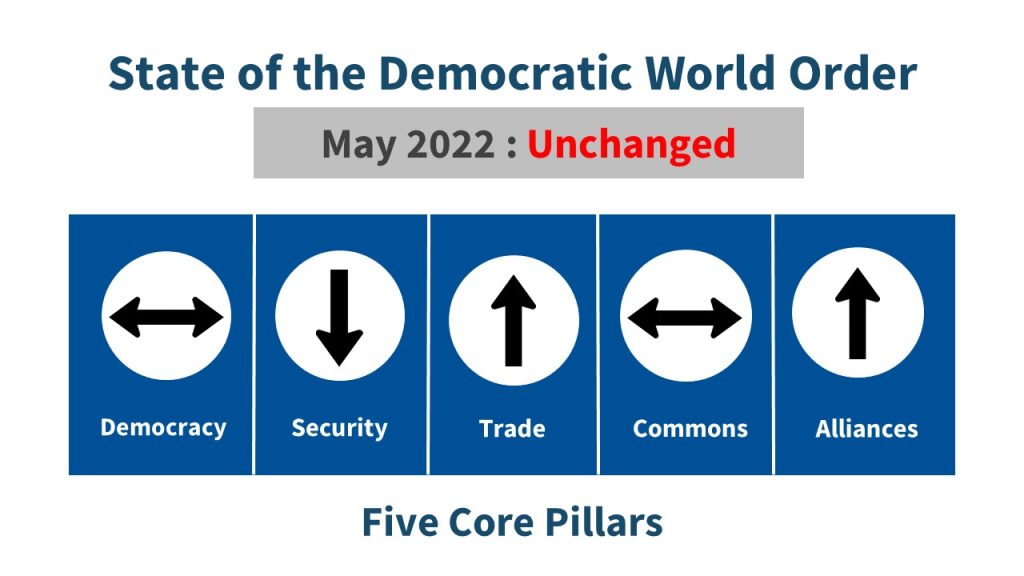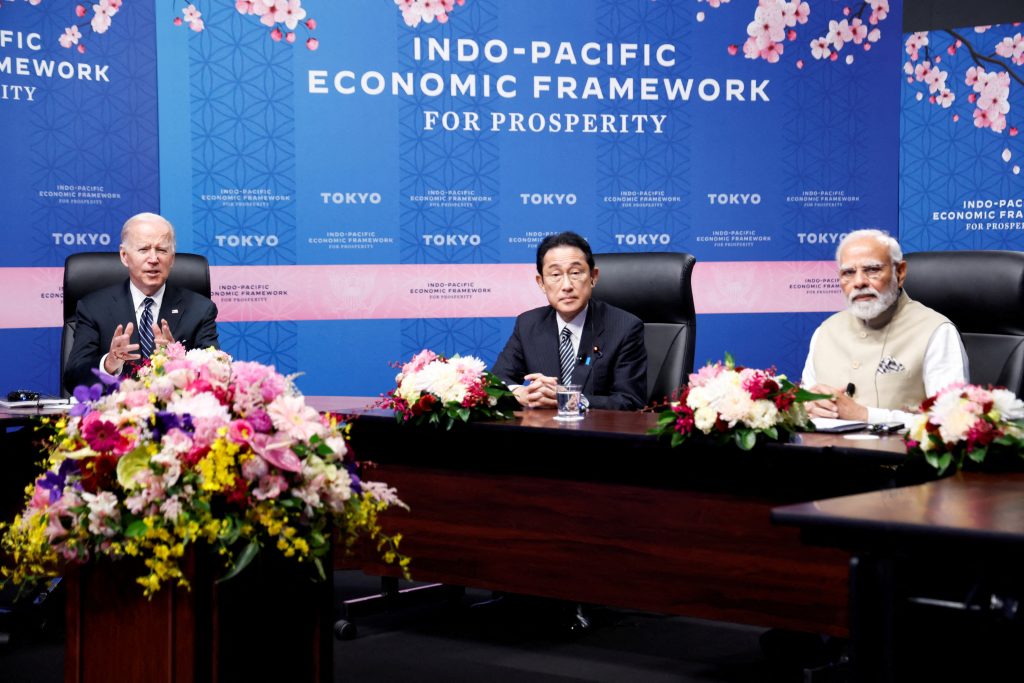Reshaping the order
This month’s topline events
Biden’s Indo-Pacific Pact. On his first visit to Asia as president, President Joe Biden unveiled plans for a new regional trade pact – the Indo-Pacific Economic Framework (IPEF) – now joined by thirteen other nations, including Australia, India, Japan, Singapore, South Korea, and Vietnam, constituting 40 percent of global GDP. With specific terms to be negotiated over the coming months, the pact focuses on four main areas: securing supply chains, expanding clean energy, fighting corruption, and fostering digital trade.
- Shaping the order. The launch of IPEF is intended to counter China’s growing economic influence in the region and could serve as a meaningful alternative for regional cooperation to the Transpacific Trade Partnership, from which Washington, under successive administrations, withdrew support. But with the framework not expected to focus on efforts to expand market access, its potential economic impact may be limited.
- Hitting home. The pact could encourage the shifting of supply chains in critical industries, such as semiconductors, away from China and toward member states – potentially creating new manufacturing jobs in the United States.
- What to do. As the Biden administration works toward a specific agreement, it should be prepared to offer tangible incentives to encourage nations to make binding commitments on IPEF’s core areas of focus. At the same time, Washington should look to develop a broader trade framework – integrating elements of IPEF and the US-EU Transatlantic Trade and Technology Council – that would bring together leading democracies across the globe to cooperate on shifting supply chains away from China and expanding free, fair, and secure trade.
Russia’s Grinding Assault. Russian forces continued to make gradual but halting advances in Ukraine’s eastern Donbas region, putting pressure on Ukrainian forces to retreat from their last pocket of resistance in Luhansk. With the war of attrition grinding on, Germany joined the US in pledging to send Ukraine high-tech anti-aircraft systems, while the EU agreed to block the import of most Russian oil by the end of 2022 and the G7 vowed to reinforce Russia’s economic and political isolation.
- Shaping the order. Despite some differences in tactics, the US and its NATO allies remained largely united in their support for Ukraine and in their efforts to penalize Moscow for its unjustified invasion. But with the war appearing likely to drag on for months to come, Russia’s incremental gains could bring the Kremlin closer to its objective of fully capturing Ukraine’s Luhansk and Donetsk regions.
- Hitting home. Recognizing that the American people have a stake in standing up to Russian aggression, Congress, on a bipartisan basis, approved a $40 billion military and humanitarian aid package for Ukraine.
- What to do. With Ukrainian forces reportedly falling short on supplies, Washington should act quickly to complete the delivery of military equipment promised by the US and its NATO allies, while being responsive to new Ukrainian requests to increase the assistance it needs to prevail.
China in the Solomon Islands. With China’s foreign minister Wang Li kicking off a tour of the Pacific, Beijing announced that the Solomon Islands had agreed to expand bilateral cooperation, including on China’s Belt and Road Initiative. The move comes after the two nations signed a groundbreaking security agreement that could allow China to send security forces to the nation and enable Chinese navy ships to make port calls. But a subsequent pact proposed by Beijing to advance multilateral security and development cooperation with ten Pacific Island nations was put on hold after several leaders raised concerns.
- Shaping the order. Beijing’s successful effort to establish an alliance with the Solomon Islands has raised alarm among US allies, particularly Australia and New Zealand, as it signals Beijing’s expanding military influence in the South Pacific and represents the opening of a new front in the intensifying strategic competition between the United States and China.
- Hitting home. China’s efforts to expand its security footprint in the South Pacific could pose a threat to US allies and exacerbate regional tensions, leading to greater instability and a world that is less safe for Americans.
- What to do. Washington should continue efforts to bolster diplomatic engagement with South Pacific nations, and other non-aligned nations globally, in an effort to counter China’s bid for influence.
Quote of the month
“Together with all our friends and allies, we strongly oppose revanchist, imperial and expansive ideologies – today, tomorrow and in the future. By helping Ukraine defend its democracy and freedom, we are also defending our democracy and our freedom.”
– German Chancellor Olaf Scholz, May 6, 2022

State of the Order this month: Unchanged
Assessing the five core pillars of the democratic world order
Democracy (↔)
- Ferdinand Marcos Jr., the son of the Philippines’ longtime former dictator, won a landslide election to become the country’s next president. While allowing the nation to move past former President Rodrigo Duterte’s extra-judicial killings, Marcos’ election raises new concerns given his vague promises to restore the country to the days of his father’s regime and pledge to strengthen ties with Beijing – though he has also suggested the potential for improving relations with the US.
- Hezbollah, the Iran-backed terrorist organization, and its political allies in Lebanon lost their majority in parliament, a promising development for the country’s pro-democracy faction. But with neither side able to secure a majority of seats, it remained unclear when, or even if, a new government can be formed.
- The Biden administration agreed to lift certain sanctions on Venezuela in an effort to incentivize talks between the government and the opposition – a move criticized by several members of Congress in both political parties who suggested it would grant greater legitimacy to Nicolas Maduro’s authoritarian regime. Separately, the administration acted to ease some restrictions on travel and remittances to Cuba, while indicating that it will not invite the autocratic leaders of Venezuela, Cuba, and Nicaragua to participate in the Summit of the Americas in Los Angeles.
- Overall, the democracy pillar was unchanged.
Security (↓)
- China and the Solomon Islands agreed to expand cooperation after the two nations signed a groundbreaking security agreement that could allow Beijing to establish a permanent military presence in the South Pacific.
- Russian forces made incremental advances in Ukraine’s eastern Donbas region, bringing Russian President Vladimir Putin closer to achieving his objective of fully capturing Ukraine’s Luhansk and Donetsk regions.
- While in Tokyo, Biden declared that the United States would defend Taiwan if it was attacked, a statement that was quickly walked back by White House officials who maintained that the US policy of strategic ambiguity had not changed. This was the third time in recent months that Biden had made similar remarks.
- On balance, the security pillar was weakened.
Trade (↑)
- The US announced its intent to establish the Indo-Pacific Economic Framework, a new economic accord with thirteen other nations that aims to expand cooperation in areas such as supply-chain resilience, clean energy, infrastructure, and digital trade.
- After weeks of negotiations, the EU agreed to a new sanctions package that will ban most oil imports from Russia by the end of the year, joining the US which previously imposed a complete ban on the import of Russian energy. In addition, the US announced a new sanctions package that prohibits US services to Russia, such as accounting and consultancy, and advertising on government-controlled media.
- With the US and its allies expanding cooperation and taking steps that could help reduce strategic dependence on autocratic rivals, the trade pillar was strengthened.
Commons (↔)
- With Covid deaths worldwide on the decline, officials in the US, Europe, and elsewhere continued to lift pandemic-related restrictions, including mask mandates and testing requirements. Shanghai also began to reopen after a draconian lockdown, but North Korea imposed its own strict lockdown after finally confirming its first official COVID infections.
- US navy warships sailed through the Taiwan Strait in a series of freedom of navigation operations, as China issued a warning against “intensifying tensions.”
- Overall, the global commons pillar was unchanged.
Alliances (↑)
- Sweden and Finland formally applied to join NATO, a move that the alliance will consider at its summit meeting in June. But Turkey threatened to block their ascension unless they agree to limit engagement with Kurdish groups affiliated with PKK, which the US, the EU, and others have designated as a terrorist organization.
- In bilateral visits to Tokyo and Seoul, Biden reaffirmed democratic alliances and partnerships in Indo-Pacific, including through the Quad and the newly announced Indo-Pacific Economic Framework.
- Hungary hindered European consensus on sanctions against Russia, agreeing to an EU oil embargo only after it gained broad exemption. It also insisted that Russian Orthodox Patriarch Kirill – a vocal supporter of Moscow’s invasion of Ukraine – not be included in a new list of sanctioned individuals.
- On balance, the alliance pillar was strengthened.
Strengthened (↑)________Unchanged (↔)________Weakened (↓)
What is the democratic world order? Also known as the liberal order, the rules-based order, or simply the free world, the democratic world order encompasses the rules, norms, alliances, and institutions created and supported by leading democracies over the past seven decades to foster security, democracy, prosperity, and a healthy planet.
This month’s top reads
Three must-read commentaries on the democratic order
- Hal Brands, in Foreign Affairs, outlines a “free world strategy” for the United States and its allies to succeed in the clash between advanced democracies committed to the existing international order and the Eurasian autocracies trying to overturn it.
- Michèle Flournoy, also in Foreign Affairs, argues that the United States must accelerate support for vulnerable partners in order to deter potential future aggression by Russia, China, and other authoritarian states.
- David Frum, in The Atlantic, contends that Biden is right to assert that the US will defend Taiwan, and that the US policy of strategic ambiguity no longer serves a useful purpose.
Action and analysis by the Atlantic Council
Our experts weigh in on this month’s events
- Fred Kempe, in CNBC, sets forth five crucial tests that Ukraine and its global partners and allies must tackle as Putin’s criminal war approaches its most decisive phase.
- Dan Fried, speaking at a conference in Estonia, suggested that the advance of liberal, democratic values has historically faced setbacks, but in the long term, freedom can – and must – triumph over tyranny.
- Aleksandra Gadzala Tirziu, in the New York Sun, writes on Beijing’s ideological war with the West as China works to disrupt and replace the rules-based democratic order.
- Patrick Quirk and David Shullman, in the New Atlanticist, outline how the US can push back against Russia and China as they accelerate their efforts to undermine democratic institutions and bolster illiberal leaders.
__________________________________________________
The Democratic Order Initiative is an Atlantic Council initiative aimed at reenergizing American global leadership and strengthening cooperation among the world’s democracies in support of a rules-based democratic order. Sign on to the Council’s Declaration of Principles for Freedom, Prosperity, and Peace by clicking here.
Ash Jain – Director for Democratic Order
Dan Fried – Distinguished Fellow
Jeffrey Cimmino – Associate Director
Danielle Miller – Program Assistant
Otto Hastrup Svendsen – Georgetown Student Researcher
If you would like to be added to our email list for future publications and events, or to learn more about the Democratic Order Initiative, please email AJain@atlanticcouncil.org.
Image: U.S. President Joe Biden delivers remarks along with India's Prime Minister Narendra Modi and Japan's Prime Minister Fumio Kishida during the Indo-Pacific Economic Framework for Prosperity (IPEF) launch event at Izumi Garden Gallery in Tokyo, Japan, May 23, 2022. REUTERS/Jonathan Ernst
